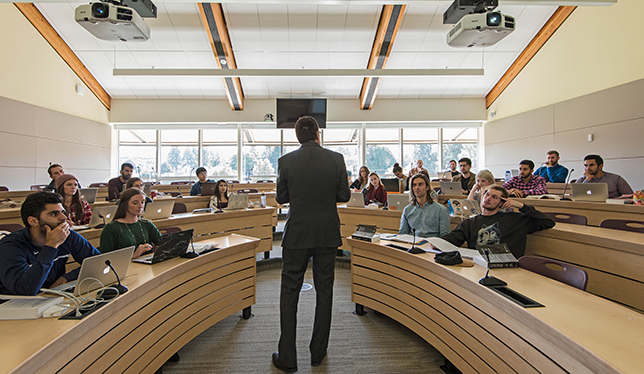Addressing gaps in Canadian research data management
A comprehensive guide of the Portage Network.

Research data are valuable outputs of the scholarly process. The value is multidimensional in offering the potential for data mining, data re-use, validation of published results, giving credit and recognition for transparency, and commitment to the scrutiny and critical evaluation of accessible research data. There are also growing demands by journal publishers and funding agencies to preserve and provide appropriate access to data underpinning published research.
In Canada, researchers and institutions face challenges stemming from a lack of comprehensive digital research infrastructure (DRI). Managing Big Data adds further infrastructure challenges. Research data management (RDM) is a key component of DRI – and providing researchers with tools and support to implement RDM best practices throughout the research lifecycle is essential to ensuring effective data collection, description, storage, discovery, and reuse. Responding to these challenges requires coordination and collaboration among local, regional, provincial, and national stakeholders.
Enter the Portage Network
Launched in 2015 by the Canadian Association of Research Libraries (CARL), the Portage Network contributes to the shared stewardship of research data and addresses specific gaps in national RDM infrastructure in Canada. The network aims to assist researchers, institutions, and other RDM stakeholders through a broad network of RDM experts and national online platforms for planning, preserving, and discovering research data.
The Portage Network, in close collaboration with a range of infrastructure partners, has developed and deployed a suite of nationally-coordinated services and infrastructure platforms designed to help researchers and institutions address key RDM challenges. Its federated model has proven very effective in coordinating and supporting RDM efforts at the local, regional, provincial, and national level.
Goals of the network
- Foster a community of practice for RDM: A primary objective of Portage is to build a network of expertise for research data management. Critical aspects of this are to coordinate and expand on expertise and services within Canadian academic libraries and to build capacity in specific areas of research data management.
- Facilitate and provide leadership in the development of RDM infrastructure: Portage seeks to advance the development of national platforms for planning, curating, preserving and discovering research data. This will require working with infrastructure providers, both in the library community and elsewhere, to develop new tools where gaps exist, and to bridge systems where interoperability is required.
- Engage and advocate for RDM with stakeholder communities: The task of managing data from research across Canada requires community-wide involvement and collaboration. The two major components of the network build upon a thorough understanding of researchers’ needs and solid working relationships with funding agencies, data stewards, infrastructure providers, regional academic library consortia and international collaborators.
A set of fundamental principles, which encompass, among other things, inclusiveness, stewardship, openness, and respect for privacy, guides Portage. A small national secretariat at CARL supports Portage, and a steering committee of research library directors and an advisory committee composed of non-library partners and other stakeholders contributes to governance. Portage collaborates broadly with partners in the research community, including Compute Canada, regional library consortia, CANARIE, Research Data Canada, and organizations representing a diverse range of stakeholder groups, including research administrators, ethics boards, and information technology, as well as the tri-agency funding bodies (CIHR, NSERC, SSHRC). Portage has also been an engaged member of the Leadership Council on Digital Research Infrastructure (LCDRI), which has provided a vision and description of RDM needs within the digital research ecosystem to Innovation and Economic Development Canada (ISED).
Network of expertise
The Portage Network of expertise develops and provides resources, expert advice, and practical help to assist with the management of research data throughout all stages of the data lifecycle.

The Research Data Lifecycle
This expertise (available in both official languages) is accessible to anyone working in a Canadian university or research institution intending to plan, manage, store, protect, share, and preserve digital research data.
Portage has launched several expert groups to contribute to the development and maintenance of resources and expert advice. There are currently active groups in the following key areas:
- Data management planning
- Data discovery
- Curation
- Preservation
- Training
- Institutional planning
- Responsible RDM practices for sensitive data
The network currently consists of over 115 volunteer experts drawn from over 40 universities and other stakeholders groups, from across the country.

Outputs
Portage expert and working groups have produced a number of key white papers, reports, and resources directly related to the advancement of RDM in Canada. Topics covered include collections, training, discovery, preservation, and institutional RDM strategies.
A new working group on the responsible treatment of sensitive data is looking into deposit-friendly language for ethics applications and an environmental scan of best practices surrounding Indigenous data.
DMP Assistant
The DMP Assistant is a national, online, bilingual platform, populated with institution- and domain-specific templates designed to help researchers in the development of data management plans (DMPs). It guides researchers step-by-step through key questions about data management, including:
- Data collection
- Documentation and metadata
- Storage and backup
- Preservation
- Sharing and reuse
- Responsibilities and resources
- Ethics and legal compliance
Federated Research Data Repository (FRDR)
The FRDR provides Canadian researchers with a scalable, federated, repository option that supports research data curation, deposit, preservation, discovery, sharing, and citation. A key feature of FRDR is its ability to handle “big data” upload and download – a challenge not currently met by existing repository options.
In addition, FRDR provides a national research data discovery platform by harvesting metadata from over 30 Canadian repositories and providing access through a single search tool. This national focal point for discovery, along with robust and scalable repository features, make FRDR an ideal option for researchers seeking to manage Big Data in Canada.
Dataverse North
The Portage Dataverse North Working Group is investigating ways to grow and coordinate use of the open source Dataverse repository platform in Canada. The group is exploring nationally-coordinated strategies designed to better serve current and potential users of Dataverse, including the possibility of replacing multiple Canadian instances and versions of Dataverse with a single national Dataverse repository option. The group is also looking at improved training, targeted infrastructure development, and partnerships with other stakeholders to improve Dataverse features and functionality.
Training
Portage currently provides a range of RDM training resources and is developing online training modules in French and English to instruct researchers and other stakeholders about RDM in the Canadian context. A growing library of external training resources is also available on the Portage website. Portage also offers help in the development and delivery of RDM training, covering a wide range of RDM topics of interest to researchers.
Looking ahead
The federal government’s 2018 budget included $572.5 million dollars for digital research infrastructure (DRI) — and RDM is an integral part of DRI. This new federal funding, combined with continued support from CARL research libraries, puts Portage on solid footing to continue working with our network of experts and other stakeholders in developing the tools, resources, and services Canadian researchers need to meet the RDM challenges ahead.




Post a comment
University Affairs moderates all comments according to the following guidelines. If approved, comments generally appear within one business day. We may republish particularly insightful remarks in our print edition or elsewhere.